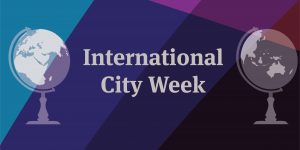As part of International City Week we asked Library Staff for their favourite books written by international authors or with an international theme. Check out their recommendations below.
Tove Jannsson, Moomins series*
“Moomins are adorable, and very gentle, and mostly kind”.
Ficciones by Jorge Luis Borges
“One of my favourites would definitely be the blind Argentinian librarian Jorge Luis Borges. It’s hard to select one specific book by him; I’ll go with Ficciones, which is a selection of stories. Borges’s oeuvre is a world of its own: a mesmerising rumination on life and the limits of our thought and logical reasoning; plays with permutations and time; human life viewed from above like in the paintings of Bruegel the Elder or Hieronymus Bosch. It’s literature that demands intellectual involvement – which certainly pays off.
For anyone interested in getting more insight in the thought and (sometimes humorous!) personality of Borges, I would also recommend reading his conversations with Richard Burgin in the “Last Interview” series published by Melville House ” says Dita.
Elsa Morante’s House of Liars†
“A very unknown book, written by one of the best Italian authors of the 20th century. It’s a family history, taking place in Southern Italy. All the characters are vivid and full of flaws, an aspect that makes them very relatable (if not always likeable)”, says Martina.
Salman Rushdie’s Midnights Children or Ben Okri’s The Famished Road
“Both books taught me much about the countries in which they are set. They actually create language”, says Jonathan Winter.
“Set in Japan all of his books have great characters and his love of music, cooking and cats are always involved. I always look forward to his new books coming out. Some of short stories were adapted to the theatre by Theatre de Complicite and shown at the Barbican. I would thoroughly recommend giving his books a go” says Lisa
“A dark, feminist fantasy with fairy tale elements that is an engrossing read.”
Tomasi di Lampedusa’s The Leopard*
“Favourite book ever. This is a real masterpiece and Lampedusa’s only novel. I have only read the translation. It is set in Sicily, the closing chapters are very moving and I’ve not read many other novels which give the same feels. I don’t think we have it in the Library but the book is quite famous for it’s evocation of sumptuous food.
I also recommend Carluccio and the Leopard, where Carluccio – the gorgeous giant of Italian cooking – recreates some of those recipes in the book”.
“This book tells the story of a young man who fled Czech in 1930s on kindertransport. It’s very sad in a quiet devastating way. I read this on the way to work. The same train route is mentioned in the novel. I am not sure what the translation is like, but if it’s like the original it will be very good.”
Elif Şafak’s The Architect’s Apprentice*
“A gorgeous, rich novel which instantly transports you to 16th century Ottoman Istanbul. “But Istanbul is a city of easy forgettings. Things are written in water over there, except the works of my master, which are written in stone” says Hannah.
Travels with Herodotus by Ryszard Kapuscinski
“What a charming book. Packs a punch and you learn something.”
Marina Lewycka’s A Short History of Tractors in Ukrainian
“I have happy memories of being sat reading this on the bus, laughing out loud so much my sides hurt and being stared at by other passengers wishing they were having as much fun as I was.”
Alain-Fournier’s Le Grand Meaulnes (AKA The Lost Estate or The Lost Domain or Der große Meaulnes)*
“Written in France just before the First World War, it is a poignant coming of age novel that I first read in my late teens and it has stayed with me ever since. John Fowles described as “the greatest novel of adolescence in European literature”, which I agree with. I may have been a teen 86 years after it was written, but it still struck home, representing the emotions of adolescence and what you lose when you grow up. Tragically, it was Fournier’s only book as he was killed in the first few weeks of the First World War a year after its publication”, says Rachel.
“Not read much these days, he sums up Paris and New York for me in a way no other author does”.
“Tolstoi definitely knew what passions and love were about. I read this book in about two weeks. I was literally flying through it every time Anna was on the scene. I’m not sure whether Tolstoi wanted to show her as a sinner or a heroine, but for me she is definitely the latter.” says Martina.
Karl Ove Knausgard* or Dostoyevski
“Karl Ove Knausgard – at the moment. One of my whole time favourite is Dostoyevski. Knausgard’s writing is not literary but his story telling is very engaging and his descriptions are amazing. The subject matter, describing his family history is also fascinating. Dostoyvski’s writing is simply amazing. In Crime and Punishment he describes brilliantly the mind of the criminal and the suspense is intense.” says Lenka.
Harper Lee’s To Kill a Mockingbird
“It opened my eyes to serious issues at an early age, much to the embarrassment of my parents.” says Lynn.
Eli Goldstone’s Strange Heart Beating*
“Seb’s wife beautiful Latvian wife Leda is killed by a swan and Seb ends up searching more to find out about her background. A very moving examination of longing, grief, love and international themes. I highly recommend it”.
* Held by Islington Libraries
† Held at Senate House Library
What’s your favourite international book or author? Tell us in the comments below:

In the Skin of a Lion by Michael Ondaatje – a masterpiece on culture integration and preservation
Chess Story by Stefan Zweig – a short story with a big punch about how two very different approaches can bring people together
Thanks for your suggestions Sarah!